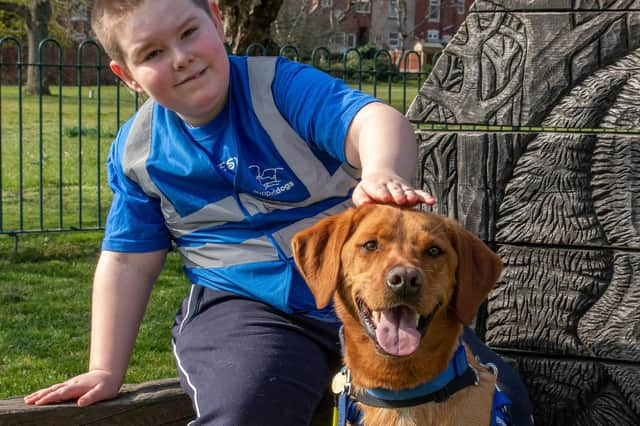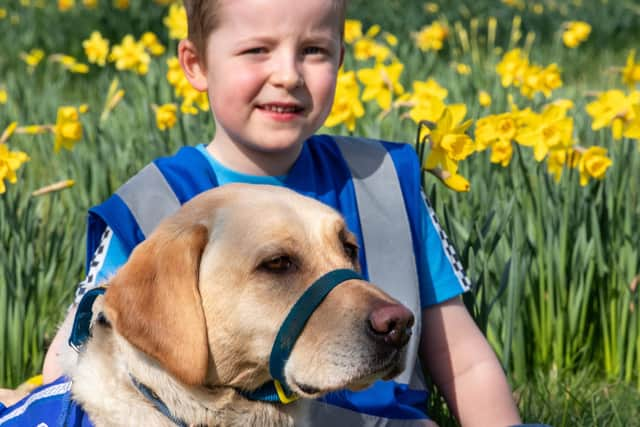How two Labradors from Sheffield charity Support Dogs are changing the lives of two boys with autism


For the first six years of Jacob Brailsford’s life, the only way he’d go to the supermarket was if he was sat in a shopping trolley, hidden under his coat.
Getting him out of the house at all was a challenge for mum Rachel and life became so tough that she gave up work to focus all her attention on her son, who was diagnosed with severe autism and anxiety just before his third birthday.
Advertisement
Hide AdAdvertisement
Hide AdLife for the family is now on a different track, however, and it’s thanks to the calming influence of an autism assistance dog for seven-year-old Jacob. They welcomed Labrador Jai Jayy last September after being on the Support Dogs’ waiting list for three years - longer than expected due to the pandemic.


The Sheffield-based national assistance dogs charity is celebrating its 30th anniversary and has been helping adults and children with autism, epilepsy and a number of serious medical conditions since 1992, supporting them to lead safer and more independent lives.
“Jacob was so excited to get Jai Jayy,” says Rachel, of Sheffield. “They had an instant bond, a bond I just can’t describe. I would never have thought a dog could make such a difference.”
Jacob was diagnosed with autism after failing to start speaking and having poor mobility as a toddler. He suffered from extreme anxiety even as a baby. “It was very hard work,” recalls Rachel, who is now back in work as a part-time support work in the renal unit at the Northern General Hospital. “I used to work in the community as a support worker, but had to quit my job as I couldn’t cope.”
Advertisement
Hide AdAdvertisement
Hide AdJacob struggled at nursery school and Rachel was regularly called to take him home because his behaviour was impacting other children. Autism affected the family’s life in every way.
“We persevered, but it wasn’t easy,” says Rachel. “On the rare occasion that we went out for meal we’d usually have to leave after half an hour. Supermarkets were a nightmare. We could never get him into the park – it was hard to even get him out of the house.”
Rachel and partner Delton found out about Support Dogs after meeting another family who had benefited from the charity at an autism fair. Jai Jayy helps to calm Jacob down when he becomes worked up and anxious. The difference, Rachel says, has been remarkable.
“Jacob is so happy to see Jai Jayy when he comes home from school, and seems happier in himself. He’s like his best friend. Jacob doesn’t hide away anymore. A friend of mine has a couple of hyperactive kids and Jacob’s never been able to cope with them. The other week she came round, and I was getting ready for him to leg it upstairs, but he just sat on the settee. Such a difference.”
Advertisement
Hide AdAdvertisement
Hide Ad“Just having Jai Jay there just reassures Jacob, I think,” she adds. “Having Jai Jayy has really changed things for us.”
As well as providing companionship and helping to reduce stress in social environments, Support Dogs’ autism assistance dogs are trained to help keep children safe.
The child holds onto a handle on their dog’s harness and the animal is trained to ‘brace’ if the child tries to run into the road. For the Nutton family in Barnsley, that has proved to be invaluable.
Mum Gemma describes her five-year-old son Stanley as being “like 5,000 Duracell batteries on all the time. He’s at energy level one million...If there was a cliff, he’d run off it”.
Advertisement
Hide AdAdvertisement
Hide AdStanley, like many youngsters with autism, has limited sense of danger and used to terrify his family by bolting and running into the road.
He would wear an ‘adventure belt’ around his waist which was attached to his mum’s waist or use a special needs buggy to keep him safe. But since the family welcomed Dawnay the Labrador into their home, trips outside are no longer fraught with danger.
“Stanley is a really bad bolter, he is terrible near roads and his concentration is not very good,” explains Gemma. “When we started training with Dawnay we discussed if he had the capacity to hold on to her handle.
“Now he holds onto it even when he’s not supposed to and will stop at the kerb with Dawnay. He will even say ‘kerb’, whereas before he used to run off all the time.
Advertisement
Hide AdAdvertisement
Hide Ad“When he’s with her he manages to concentrate, hold the handle and stop by the roadside. When he is attached to Dawnay she is brilliant with her brace, and we know he is safe.”
Gemma and Stanley’s dad Alan applied to Support Dogs after an Internet search to see what support was available following their son’s diagnosis.
“When our little boy was diagnosed with autism, it was like a grieving process,” Gemma says.
“We had to accept that his future could look different to the typical life you have mapped out in your head when you have a child, we had to jump into his world and see everything differently.”
Advertisement
Hide AdAdvertisement
Hide AdDawnay also has a close bond with Stanley’s elder sister, Eva, aged eight, who has autism, but is high functioning, and has anxiety.
“Dawnay is like a massive blanket. She goes and sits next to her and licks her face and turns from being upset and anxious to laughter,” adds Gemma. “She is great at picking up emotions. She is just the right amount of everything.”
Despite the Covid pandemic leading to longer waits for its services and a drop in income, in 2022 Support Dogs is looking to expand to provide more help for more families.
Over the past 30 years demand for the its services, which are provided entirely free of charge, have increased dramatically, and for every dog it trains, the charity says it now receives more than 50 further requests for help.
Advertisement
Hide AdAdvertisement
Hide AdAs well as transforming human lives, the charity says it prides itself on giving dogs from rescue centres a second chance – one in four of its assistance dogs is a rescue dog. It also recently set up its own puppy programme, sourcing puppies from reputable breeders.
For more information, visit www.supportdogs.org.uk